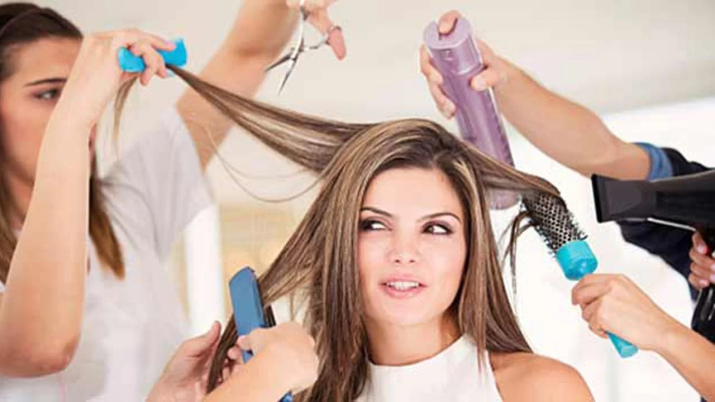Pregnancy is a time when many women become more cautious about their beauty treatments, given the potential effects on their baby’s health. Hair rebonding, a popular method for achieving straight and sleek hair, can be a concern due to the chemicals typically used. However, organic hair rebonding offers a safer alternative. This article explores safe organic hair rebonding techniques suitable for pregnant women, ensuring you look your best without compromising your or your baby’s health.
Understanding Organic Hair Rebonding
What is Organic Hair Rebonding?
Unlike traditional hair rebonding that uses harsh chemicals, organic rebonding utilizes natural and less aggressive ingredients. These products are generally free from ammonia, formaldehyde, and other harsh chemicals, making them ideal for pregnant women.
Benefits of Choosing Organic Rebonding
The main advantage of organic hair rebonding is its safety profile. It reduces exposure to toxic chemicals that can potentially harm fetal development. Additionally, these treatments are often enriched with natural oils and proteins, promoting healthier hair.
Why Consider Hair Rebonding During Pregnancy?
Pregnancy can cause hormonal changes that affect hair texture and growth. Some women find their hair becomes frizzier or harder to manage. Organic hair rebonding can simplify hair maintenance and boost self-esteem during a time when many women feel vulnerable about their appearance.
Safety Concerns with Hair Rebonding in Pregnancy
Chemicals to Avoid It’s crucial to avoid treatments containing formaldehyde, thioglycolates, or ammonia. These compounds can be absorbed through the scalp and potentially affect the fetus.
The Safe Period for Hair Treatments During Pregnancy Generally, it’s advised to wait until the second trimester when the risk of chemical exposure causing harm to the fetus is lower.
Choosing the Right Products
Ingredients to Look for Products containing natural ingredients like cysteine, keratin, and botanical extracts are preferable. Avoid those with strong odors or known allergens.
Recommended Brands and Products There are several brands that offer organic rebonding solutions. Look for products with positive reviews from pregnant women and consult with your stylist for recommendations.
The Process of Organic Hair Rebonding
The process typically involves applying the rebonding formula to the hair, followed by careful temperature control using a flat iron. The key is to maintain lower temperatures to prevent any scalp damage or discomfort.
Pre-Rebonding Considerations
Before deciding on hair rebonding, have a detailed consultation with both a dermatologist and your obstetrician. A scalp and hair assessment should also be done to ensure your hair is in good condition for the treatment.
Post-Rebonding Care
After rebonding, maintaining hair health is crucial. Use sulfate-free shampoos, deep conditioning treatments, and avoid excessive heat. Regular trims will also help keep your hair looking fresh.
Home vs. Salon Rebonding
While home kits are available, professional application at a salon is recommended, especially during pregnancy. Salons can provide a controlled environment with adequate ventilation and experienced professionals.
Alternative Hair Straightening Methods
If you’re hesitant about rebonding, consider natural remedies such as coconut milk and lemon juice or other less invasive salon treatments like silk press.
Real Experiences: Testimonials and Advice
Hear from other pregnant women who have undergone organic hair rebonding, sharing their experiences and outcomes.
Expert Advice
Tips from healthcare and hair care professionals can guide your decision, emphasizing the importance of choosing treatments that are safe for both you and your baby.
Cost Considerations
Organic treatments can be more expensive than traditional methods. Plan your budget accordingly and consider it an investment in your safety and well-being.
Conclusion
Choosing the right beauty treatments during pregnancy is crucial for both the health and well-being of the expectant mother and the baby. Organic hair rebonding presents a viable option for those wishing to manage their hair aesthetics safely. It minimizes exposure to harsh chemicals and aligns with the heightened safety considerations necessary during this sensitive period. However, it’s essential to proceed with caution, prioritizing professional advice and choosing certified organic products designed for sensitive individuals. Embracing organic hair rebonding can enhance self-esteem and maintain hair health, provided it is done thoughtfully and safely.
Frequently Asked Questions
Is organic hair rebonding completely safe during pregnancy?
While organic hair rebonding is safer than traditional methods due to the absence of harsh chemicals, no chemical treatment can be guaranteed completely safe during pregnancy. It’s best to consult with healthcare providers to discuss individual risks.
How often can I undergo organic hair rebonding during my pregnancy?
It’s advisable to limit chemical treatments during pregnancy. If you choose to proceed with organic hair rebonding, doing so once during the pregnancy is recommended, preferably during the second trimester.
What are the signs that I should avoid hair rebonding while pregnant?
Avoid hair rebonding if you experience scalp sensitivity, excessive hair loss, or any allergic reactions to hair products. Always perform a patch test before proceeding with the treatment.
Can hair rebonding affect my baby?
Direct effects on the baby from hair rebonding are unlikely if non-toxic, organic products are used. However, minimizing chemical exposure during pregnancy is generally advised to avoid any potential risks.
Are there any specific brands that are best for pregnant women?
Look for brands that specialize in organic and natural hair care products. These should be free from ammonia, formaldehyde, and other harsh chemicals. It’s also beneficial to seek out brands with positive testimonials from other pregnant women and endorsements from dermatologists.
